Related Research Articles

A container ship is a cargo ship that carries all of its load in truck-size intermodal containers, in a technique called containerization. Container ships are a common means of commercial intermodal freight transport and now carry most seagoing non-bulk cargo.
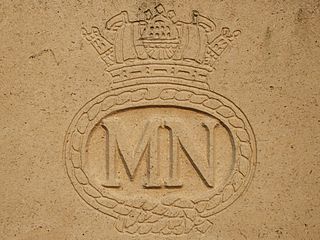
The British Merchant Navy is the collective name given to British civilian ships. In the UK, it is simply referred to as the Merchant Navy or MN. Merchant Navy vessels fly the Red Ensign and are regulated by the Maritime and Coastguard Agency (MCA). King George V bestowed the title of "Merchant Navy" on the British merchant shipping fleets following their service in the First World War; a number of other nations have since adopted the title. Previously it had been known as the Mercantile Marine or Merchant Service, although the term "Merchant Navy" was already informally used from the 19th century.
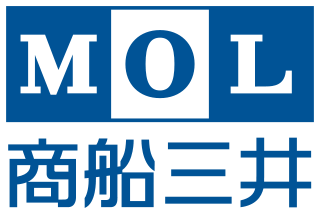
Mitsui O.S.K. Lines is a Japanese transport company headquartered in Toranomon, Minato, Tokyo, Japan. It is one of the largest shipping companies in the world.

Hyundai Glovis Co., Ltd. is a logistics company headquartered in Seoul, South Korea and part of the Hyundai Kia Automotive Group. Its predecessor company, Hankook Logitech Co. Ltd was formed in February 2001. Hyundai Glovis supplies ocean transportation logistics advice, cargo space, loading/unloading, and packaging services. It changed its name to Hyundai Glovis in June 2003.

A cargo ship or freighter is a merchant ship that carries cargo, goods, and materials from one port to another. Thousands of cargo carriers ply the world's seas and oceans each year, handling the bulk of international trade. Cargo ships are usually specially designed for the task, often being equipped with cranes and other mechanisms to load and unload, and come in all sizes. Today, they are almost always built of welded steel, and with some exceptions generally have a life expectancy of 25 to 30 years before being scrapped.

A merchant ship, merchant vessel, trading vessel, or merchantman is a watercraft that transports cargo or carries passengers for hire. This is in contrast to pleasure craft, which are used for personal recreation, and naval ships, which are used for military purposes.
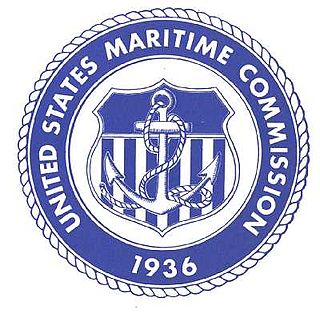
The United States Maritime Commission (MARCOM) was an independent executive agency of the U.S. federal government that was created by the Merchant Marine Act of 1936, which was passed by Congress on June 29, 1936, and was abolished on May 24, 1950. The commission replaced the United States Shipping Board which had existed since World War I. It was intended to formulate a merchant shipbuilding program to design and build five hundred modern merchant cargo ships to replace the World War I vintage vessels that comprised the bulk of the United States Merchant Marine, and to administer a subsidy system authorized by the Act to offset the cost differential between building in the U.S. and operating ships under the American flag. It also formed the United States Maritime Service for the training of seagoing ship's officers to man the new fleet.

CP Ships was a large Canadian shipping company established in the 19th century. From the late 1880s until after World War II, the company was Canada's largest operator of Atlantic and Pacific steamships. Many immigrants travelled on CP ships from Europe to Canada. In 1914 the sinking of the Canadian Pacific steamship RMS Empress of Ireland just before World War I became largest maritime disaster in Canadian history. The company provided Canadian Merchant Navy vessels in World Wars I and II. Twelve vessels were lost due to enemy action in World War II, including the RMS Empress of Britain, which was the largest ship ever sunk by a German U-boat.

A tanker is a ship designed to transport or store liquids or gases in bulk. Major types of tankship include the oil tanker, the chemical tanker, cargo ships, and a gas carrier. Tankers also carry commodities such as vegetable oils, molasses and wine. In the United States Navy and Military Sealift Command, a tanker used to refuel other ships is called an oiler but many other navies use the terms tanker and replenishment tanker. Tankers were first developed in the late 19th century as iron and steel hulls and pumping systems were developed. As of 2005, there were just over 4,000 tankers and supertankers 10,000 LT DWT or greater operating worldwide.

The Hellenic Merchant Navy refers to the merchant navy of Greece, engaged in commerce and transportation of goods and services universally. It consists of the merchant vessels owned by Greek civilians, flying either the Greek flag or a flag of convenience. As of 2020, Greece is the largest ship owner country in the world in terms of tonnage; with a total deadweight tonnage of 364 million tons and 4,901 Greek-owned vessels. Greece is a maritime nation by tradition, as shipping is arguably the oldest form of occupation of the Greeks and a key element of Greek economic activity since the ancient times. Today it is the second largest contributor to the national economy after tourism. The Greek fleet flies a variety of flags; however, some Greek shipowners gradually return to Greece following the changes to the legislative framework governing their operations and the improvement of infrastructure.
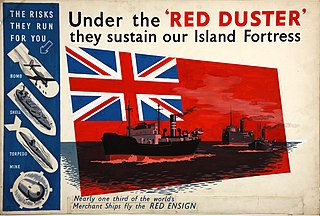
A merchant navy or merchant marine is the fleet of merchant vessels that are registered in a specific country. On merchant vessels, seafarers of various ranks and sometimes members of maritime trade unions are required by the International Convention on Standards of Training, Certification and Watchkeeping for Seafarers (STCW) to carry Merchant Mariner's Documents.

An oil tanker, also known as a petroleum tanker, is a ship designed for the bulk transport of oil or its products. There are two basic types of oil tankers: crude tankers and product tankers. Crude tankers move large quantities of unrefined crude oil from its point of extraction to refineries. Product tankers, generally much smaller, are designed to move refined products from refineries to points near consuming markets.

The history of the oil tanker is part of the evolution of the technology of oil transportation alongside the oil industry.

Greece is a maritime nation by tradition, as shipping is arguably the oldest form of occupation of the Greeks and has been a key element of Greek economic activity since ancient times. Today, shipping is the country's most important industry worth $21.9 billion in 2018. If related businesses are added, the figure jumps to $23.7 billion, employs about 392,000 people, and shipping receipts are about 1/3 of the nation's trade deficit. In 2018, the Greek Merchant Navy controlled the world's largest merchant fleet, in terms of tonnage, with a total DWT of 834,649,089 tons and a fleet of 5,626 Greek-owned vessels, according to Lloyd's List. Greece is also ranked in the top for all kinds of ships, including first for tankers and bulk carriers.

London & Overseas Freighters Ltd. (LOF) was an ocean-going merchant shipping company that for most of its history was based in the United Kingdom.

Houlder Line was a number of related British shipping companies originally established by the Houlder brothers.

The Ben Line or Ben Line Steamers, Limited was a Scottish shipping company based in Leith, Scotland founded in 1825 which was primarily involved in the Far East to Europe trade. A private company, it was largely owned by members of the Thomson family from Leith and the Thomson and Mitchell family from Alloa.
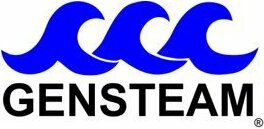
General Steamship Company was founded in 1920 in Houston, Texas, as a Private Company, and now goes by Gensteam since 1996. General Steamship Company has a fleet of cargo ships that operate worldwide. Gensteam has a Gensteam Operations Desk website that tracks all shipping logistics. Gensteam headquarters is now in San Francisco, California. General Steamship Company was part owner of American Pacific Steamship Company in New York state and Los Angeles during and post World War II. American Pacific Steamship Company was founded in 1942 in New York City, and was previously called Los Angeles Tanker Operators Inc. which operated T2 tanker ships. During World War II the General Steamship Company and American Pacific Steamship Company were active with charter shipping with the Maritime Commission and War Shipping Administration.

Sieling & Jarvis Inc. was a shipping company that operated tanker ships and some cargo ships. Sieling & Jarvis was started by David B. Jarvis and Dick Sieling in New York City. Later David B. Jarvis was the company president and later became the sole owner of Sieling & Jarvis Inc. Mr. Sieling was the vice president and a partner in Sieling & Jarvis. Sieling & Jarvis supported the World War II effort by operating United States owned ships.
References
- ↑ "Flag and Neda History". Neda Maritime Agency Co. Ltd website. Neda Maritime Agency Co. Ltd website. 20 February 2024 [live website]. Retrieved 20 February 2024.
- ↑ "Neda Maritime Agency, website, Family history". Neda Maritime Agency website. 20 February 2024. Retrieved 20 February 2024.
- ↑ "Drake Shipping Co / Lykiardopulo & Co, London". mariners-list.com. 5 September 2012. Retrieved 20 September 2012.
- ↑ "Neda Maritime Agency". www.nedamaritime.gr. Retrieved 2024-02-20.
- ↑ "Neda Maritime fleet list". Neda Maritime Agency Fleet list. 20 February 2024. Retrieved 20 February 2024.
- Info from Neda Maritime Agency website
- ↑ "Neda Maritime Agency History". Neda Maritime Agency website. 20 February 2024. Retrieved 20 February 2024.